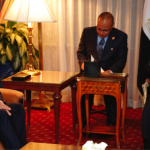Nadia Mabrouk – Al-Monitor –
Hundreds of Christian families escaped the city of el-Arish Feb. 24 after the Islamic State (IS) and its branch in Egypt, Wilayat Sinai, increased attacks on Copts there. It is believed to be the largest wave of collective displacement in Egypt since the June 1967 war. Coptic families have discretely been experiencing displacement since the Egyptian government declared a war on terrorism in July 2013, but Cairo and the media have taken an interest in this latest wave because it involves collective migration. No official census figures are available on the Coptic population in the Sinai.
The murder of seven Copts in el-Arish in sporadic incidents between Jan. 30 and Feb. 23 triggered this most recent displacement. Rev. Boulos Halim, spokesman for the Coptic Orthodox Church, told Al-Monitor that an estimated 310 Coptic families are believed to have been uprooted through mid-March. The ultimate fate of the displaced is for the moment unknown, and their return to el-Arish is uncertain.
The Evangelical Church in Ismailia was the first to open its doors to the displaced, who were temporarily lodged at the Youth Hostel in Ismailia. Social Solidarity Minister Ghada Wali visited them Feb. 25 and erroneously told them that they would be returning home in a couple of days. “Consider yourselves on a trip,” she said.
Wali’s statement sparked anger among the displaced Copts. Samir Shukri who had fled el-Arish with his family told Al-Monitor, “The minister knows nothing about the situation in el-Arish.” Shukri refuses to return to the ravaged city because it remains unsafe.
“Some culprits will be arrested, and new bodies will litter the streets,” Shukri asserted. “They tell us el-Arish is safe, but then we discover that the stench of death is following us around.” He was referring to a statement by authorities that they had killed the perpetrators who conducted a Jan. 9 attack at a checkpoint in al-Matafi, but it was later revealed that the dead alleged perpetrators had supposedly been kidnapped by security forces before the attack had occurred. The enigmatic episode has led the Christians to question the authorities’ veracity and their own safety.
Maher Zeki, a volunteer at the Monastery of Saint Anthony, which has welcomed 52 displaced families in Future City in the Ismailia governorate, said that he is betting on public solidarity to support the displaced. He noted that el-Arish residents do not want to return because of the death threats against them, so the only solution is for them to integrate into the areas in which they have sought shelter. The volunteers are ensuring the smooth flow of this process, he claimed.
Zeki’s statement aside, Halim told Al-Monitor, “The current situation of the Copts of el-Arish is temporary, until security and stability are restored in the city. The support offered is aimed at alleviating the suffering of these families.” He denied that the church plans to help the displaced resettle permanently outside Sinai or to ask the state to help them do so.
Bishop Beeman, the head of the Crisis Management Committee for the Orthodox Church, told Al-Monitor, “The church awaits the return of its children to their land, houses, work and parish in el-Arish as soon as possible. But we want them to be safe and sound and to preserve their human dignity, the honor of our country and a dear part of Egypt.”
According to Halima, an assessment by the church March 12 revealed that Ismailia has welcomed 194 Coptic families from el-Arish, while the Port Said governorate has taken in 26 families. Other Christians have sought shelter in Asyut (21 families), Minya (6 families), Sharqia (10 families), Gharbia (8 families) and Cairo (45 families).
Wali announced on March 11 that 200 displaced families would be lodged temporarily in Ismailia, Cairo, Asyut and Dakahlia governorates. Toward that goal, she designated 48 housing units in Future City for el-Arish families in the first phase of government efforts. A day later, she announced that additional units had been approved for another 48 families. The housing units are being rented from the Housing Ministry by the Social Solidarity Ministry. In a March 4 press statement, the Education Directorate in Ismailia had welcomed 129 students to schools in the governorate.
Ulfa Salama, the spokesperson for the Social Solidarity Ministry, told Al-Monitor, “The lodging of the displaced families is temporary. It is not a permanent settlement arrangement outside el-Arish. It is a step that the ministry took to grant the displaced families a sense of privacy and security, albeit temporarily.”
Salama also noted that the ministry will disburse financial assistance to those who have found refuge with family members outside el-Arish and will take care of families that do not have shelter, food, water or clothes.
Mina Nasr, who was displaced from el-Arish, told Al-Monitor that the Kasr al-Dobara Evangelical Church is currently registering all displaced Coptic families, regardless of when they arrived. Those who register will be able to request housing and job opportunities in Ismailia and other governorates as well.
Al-Monitor tried to contact Rev. Andree Zeki, head of the Evangelical Church, for data collected on displaced families, but was told to directly contact the evangelical church, which ultimately declined to respond.
__________________________
http://www.al-monitor.com/pulse/originals/2017/03/egypt-sinai-christians-displaced-return-security.html?utm_source=Boomtrain&utm_medium=manual&utm_campaign=20170321&bt_ee=qBbwYvhdsgmtNCLQ0ZTzv1EK/pehG24J3UgyxoAPJ8lPkE7hgEOivKitTyjSDyWK&bt_ts=1490112694432
Photo: A Christian woman who left el-Arish with her family during a campaign targeting Christians by Islamic State militants rests after arriving at a church in Ismailia, Egypt, Feb. 27, 2017. (photo by REUTERS/Amr Abdallah Dalsh)





